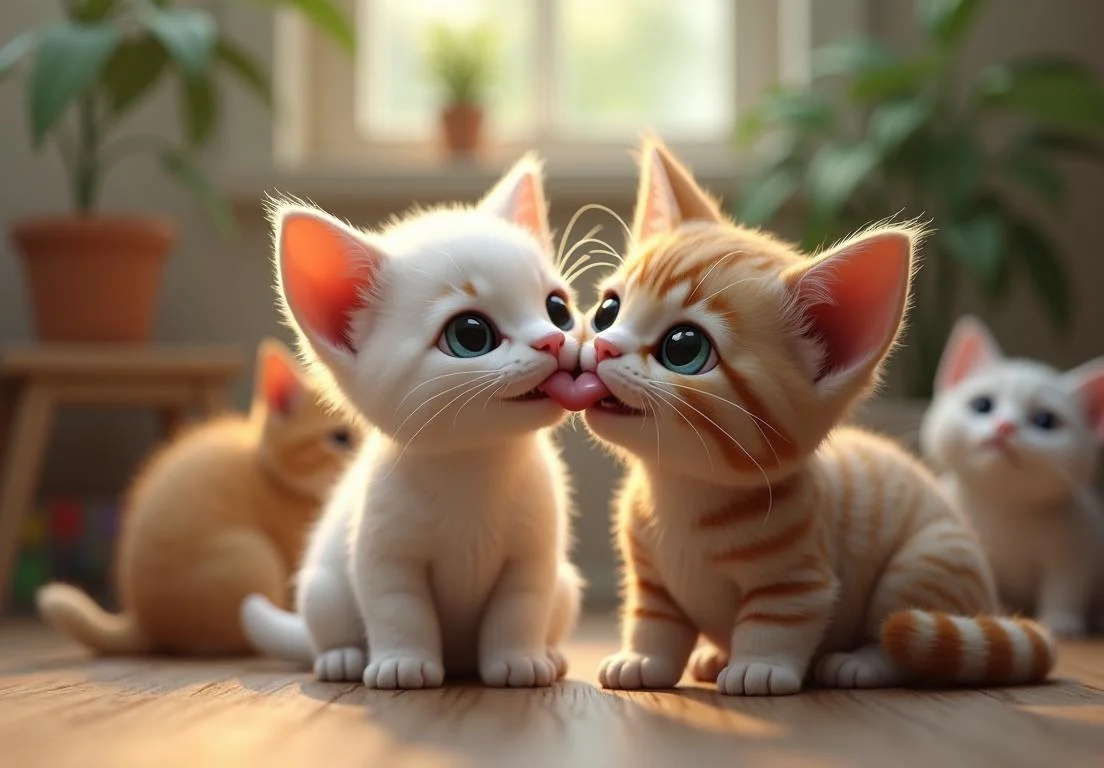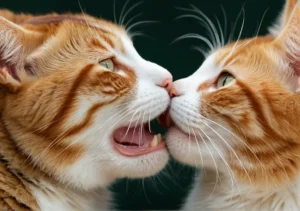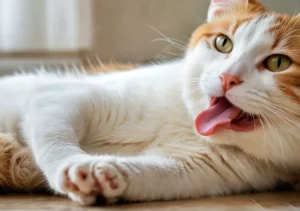Ever find yourself face to face with your feline friend, only to have them lick your cheek as if you’re an oversized cat treat? It’s a quirky behavior that often leaves cat owners puzzled. So, what’s behind this odd yet affectionate display?
Your cat licks your face for various reasons—ranging from showing love to mimicking grooming behavior. This is a common way for them to bond with you, expressing trust and affection. But there’s much more to this captivating feline action than meets the eye, and you’ll want to explore the intriguing reasons behind it.

1 Cats Show Affection
Cats often use licking as a way to express love and affection. Just like kittens groom their mothers, your feline friend might be showing that bond when they lick your face. This behavior can offer a sense of comfort and belonging, not only for them but for you too. Think of it as their way of saying, “You’re one of us.” Over time, this affectionate gesture can enhance your overall relationship, reinforcing trust and companionship.
2 Marking Their Territory
Licking is also rooted in territorial behaviors. Your cat has scent glands in their mouths, and when they lick you, they’re leaving behind their scent. This instinct is a way to claim you as part of their territory, signaling to other pets that you’re theirs. It’s like a furry badge of ownership! By marking you this way, they’re establishing their presence and enhancing that deep connection.
3 Seeking Attention
Sometimes, your cat may lick your face simply to gain your attention. If they want to play, cuddle, or just receive a few extra head scratches, they might resort to licking as a means of signaling their needs. This form of communication can be effective, especially if they’ve noticed that licking leads to a reaction from you.
4 Stress Relief
Licking can serve as a self-soothing mechanism for your cat, acting as a way to relieve stress or anxiety. In moments that feel overwhelming—like during thunderstorms or when they’re introduced to unfamiliar environments—licking can help ground them. If your cat is a frequent licker in certain situations, it might be worth identifying potential stress triggers in their environment.
5 Playful Behavior
Cats are playful creatures, and sometimes licking can just be a part of their playful antics. When they’re feeling frisky, they might engage in licking as a way to interact. It can be an invitation to bond, so if your cat is licking your face during playtime, they’re likely signaling that they want to kick things up a notch with some fun.
6 Exploration
Cats are naturally curious, and licking is one way they explore their world. Your face is part of their territory, and they might lick it to get a better understanding of you—your scent, taste, and even the texture of your skin! This behavior can be part of their instinctual drive to investigate their surroundings, closely relating to their heritage as hunters.
7 Grooming Instinct
Grooming is a key behavior for cats. They spend a considerable amount of time grooming themselves to maintain cleanliness and comfort. When your cat licks your face, it may be an extension of that grooming instinct as they attempt to clean you. This behavior can also be interpreted as their way of caring for you.
8 Bonding Ritual
In multi-pet households, you might notice that cats who groom each other often have deeper bonds. When your cat licks you, it’s likely their way of incorporating you into their social grooming rituals. This bonding experience can strengthen your relationship, echoing those strong ties found in their natural feline communities.
9 Invoking Nostalgia
Licking can trigger a sense of nostalgia. When your cat licks you, it could remind them of being a kitten who relied on their mother for care and sustenance. This instinctual behavior can evoke feelings of safety and warmth, making the licking a comforting gesture reflective of their past experiences.
10 Health Check
Lastly, frequent licking could signal that your cat is trying to communicate a need for help. If you notice excessive licking followed by signs of distress or discomfort, it’s best to consult a vet. Health issues related to skin problems or oral discomfort may prompt such behavior, so staying attuned to your cat’s habits can be essential for their well-being.
3 Mimicking Their Mother
Kittens learn a lot from their mothers, and licking is one of the primary ways they bond. It’s a sign of comfort; the mother cat licks her kittens for warmth, affection, and reassurance. As your cat grows, it might carry that behavior into adulthood, translating it to you. If your kitty licks your face, they could be expressing a familiar instinct — a throwback to those kittenhood days filled with safety and care. This behavior shows that your cat feels secure with you and views you as part of their family.
Additionally, kittens lick each other to maintain social bonds. So, when your cat licks your face, it’s not just about affection – it’s also about reinforcing that bond you share, making you feel like part of their pack. It’s sweet and endearing when you think about it!
4 Grooming Behavior
Licking is more than a cute quirk; it’s a form of grooming behavior that cats naturally engage in to maintain their cleanliness and health. When your cat licks your face, they’re not just seeking attention; they might genuinely see you as one of their own. In the wild, cats groom each other to strengthen social ties and show care.
The act can be a sign of trust and affection, as your cat might consider you a part of their social group. This behavior can be especially common in multi-pet households, where cats learn to nurture each other.
Moreover, grooming releases happy hormones like oxytocin, both for your cat and you. So, while it might be a bit sticky, that licking comes with a dose of love. Embrace it as a unique way your kitty shows they care!
5 Seeking Attention
Your cat’s licking is often a straightforward plea for attention. Just like when we nudge someone for a hug or a chat, your feline might be trying to say, “Hey, I need some love!” This behavior can be especially evident when they’re feeling a bit neglected or want to reinforce your bond.
Spending quality time with your cat can enhance this connection. Try playing with them, petting them, or simply talking to them. Positive reinforcement can make a world of difference. If you respond to their licking with affection, they’ll likely see that behavior as a successful way to get your attention.
6 Exploring Tastes and Scents
Cats are naturally curious creatures, and they explore the world using their senses. Your face, with its unique mix of oils, sweat, and even food residues, becomes an interesting canvas for them. It might be pleasant scents from dinner last night or just the familiar smell of you that draws them in.
Besides tastes, your skin can have various interesting scents based on your activities throughout the day. If you’ve been gardening, working out, or even cooking, chances are your cat is picking up on those intriguing smells.
They’re not just foraging; they’re engaging their senses, forming a connection with you based on the familiar experiences shared in your home. This blending of smells and tastes gives them comfort and strengthens their bond with you.
Understanding these nuances can help you appreciate those lick-filled moments as more than just quirky behavior; it’s your cat expressing love and curiosity in their own unique way.
7 Stress Relief
Licking isn’t just a quirky cat behavior; it’s often their way of calming down. Cats can get anxious for various reasons—new environments, loud noises, or even changes in their daily routine. This licking can help soothe their nerves, similar to how humans might fidget or chew gum when stressed. For your cat, licking your face might not only be about affection but also about finding comfort in your presence. The familiar scent and warmth of your skin can provide reassurance, helping them to relax in a world that they may find overwhelming.
Additionally, when your cat gives you those slobbery kisses, it serves as a reminder of their bond with you. Mutual grooming is a common behavior among felines, and while you may just be receiving a friendly lick, they might be trying to make themselves feel safe, just as they would with a trusted companion.
8 Competing for Your Space
In the animal kingdom, space is a big deal. When your cat licks your face, it could signal their need to assert themselves within your shared environment. If they’re feeling anxious or even a bit jealous—maybe a new pet or baby just arrived—they may resort to licking as a means of reaffirming their territory and importance in your life.
This behavior isn’t a sign of aggression, but rather a way for them to communicate their presence and place in your heart. Cats are pretty astute about their surroundings, and if they think their status might be threatened, they’ll take action. So, if your feline friend has been a bit more affectionate than usual with face-licking, it could be their way of saying, “Hey, I’m still your favorite!”
Tip: To support your cat during anxiety-inducing changes, consider creating a safe space just for them with cozy blankets, their favorite toys, and treats. This way, they’ll feel secure and loved, which might reduce the need for face-licking as a coping mechanism.
9 Understanding Their Mood
Your cat’s licking isn’t just a quirky habit; it offers real insights into their mood and feelings. Cats often lick their humans as a way to express affection. It’s their version of a warm hug or a friendly kiss. If your feline is licking you when they’re in a calm setting, like curling up on your lap, it’s likely a sign they’re feeling safe and happy.
Conversely, if your cat is licking you during playtime, it may signal excitement or an invitation to engage. Pay attention to the context—licking can also occur when they’re feeling a bit anxious, serving as a self-soothing behavior. Recognizing these nuances can deepen your bond and help you respond to their emotional needs effectively.
10 Trivia About Cat Behavior
Cats have a fascinating and intricate social structure that impacts their grooming habits—a practice that holds special significance. Unlike dogs, who primarily groom for hygiene, cats engage in licking as a form of social bonding and comfort. This behavior stems from their kittenhood, when mothers groom their young to foster closeness.
Here are some intriguing bits about why cats groom each other and why they might direct this behavior toward you:
- Social Grooming: Cats will often groom their companions as a way to reinforce relationships and show trust.
- Marking Territory: They have scent glands in their saliva, so licking can also be a way to mark you as “theirs.”
- Stress Relief: Grooming can act as a stress reliever, providing comfort in tense situations.
Understanding these behaviors can enhance your relationship with your cat by revealing their unique personality and helping you appreciate the intricate dynamics of feline life.
Alex, a passionate animal lover, has experience in training and understanding animal behavior. As a proud pet parent to two dogs and three cats, he founded AnimalReport.net to share insights from animal experts and expand his knowledge of the animal kingdom.




